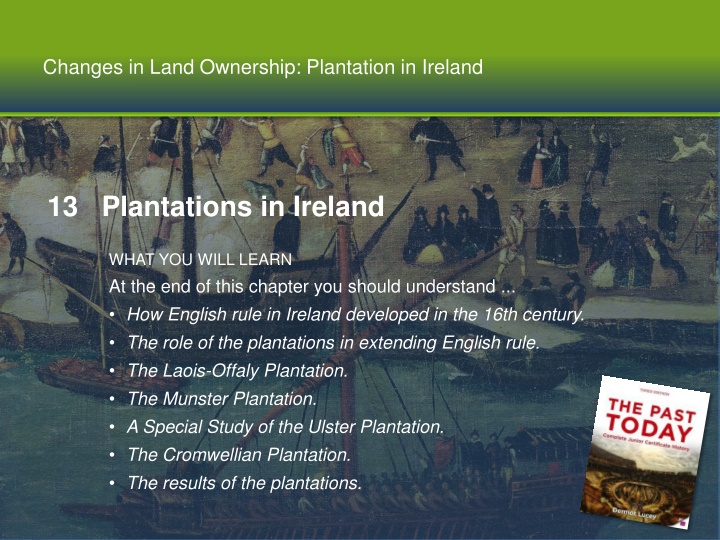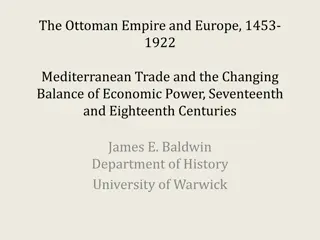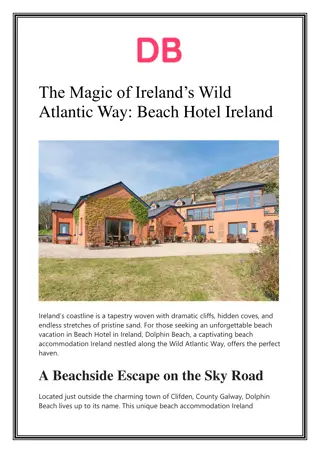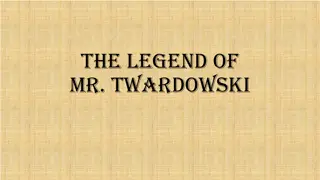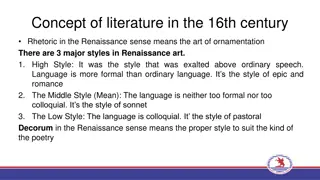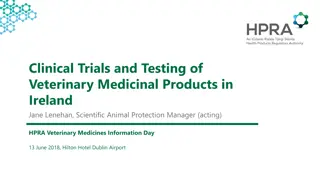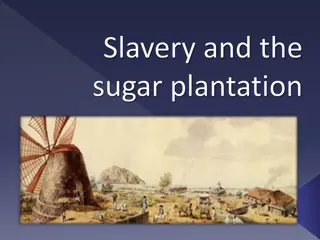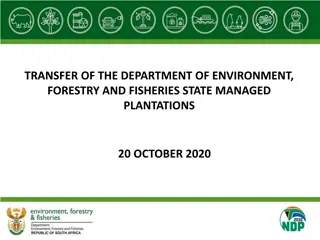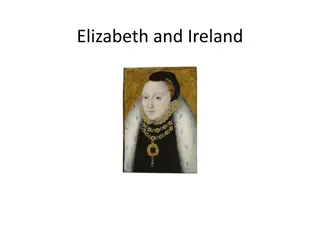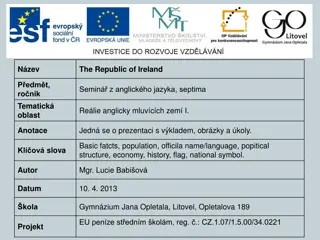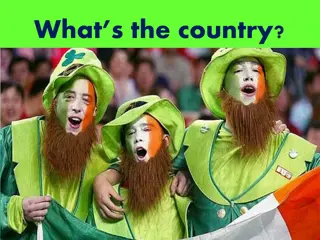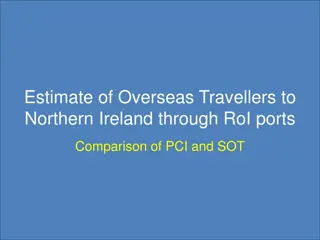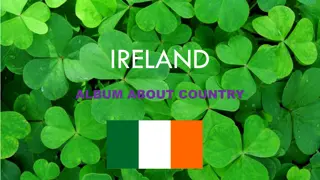Plantations in Ireland: Development of English Rule in the 16th Century
Dive into the historical significance of plantations in Ireland during the 16th century, understanding how English rule evolved, the various plantations established like Laois-Offaly and Munster, the impact of Tudor efforts to conquer Ireland, and the reasons behind the failure of certain plantations. Explore the differences between Gaelic Brehon law and English common law, the motives behind the plantations, and the results they yielded.
Download Presentation

Please find below an Image/Link to download the presentation.
The content on the website is provided AS IS for your information and personal use only. It may not be sold, licensed, or shared on other websites without obtaining consent from the author.If you encounter any issues during the download, it is possible that the publisher has removed the file from their server.
You are allowed to download the files provided on this website for personal or commercial use, subject to the condition that they are used lawfully. All files are the property of their respective owners.
The content on the website is provided AS IS for your information and personal use only. It may not be sold, licensed, or shared on other websites without obtaining consent from the author.
E N D
Presentation Transcript
Changes in Land Ownership: Plantation in Ireland 13 Plantations in Ireland WHAT YOU WILL LEARN At the end of this chapter you should understand ... How English rule in Ireland developed in the 16th century. The role of the plantations in extending English rule. The Laois-Offaly Plantation. The Munster Plantation. A Special Study of the Ulster Plantation. The Cromwellian Plantation. The results of the plantations. Chapter 13 | Plantations in Ireland
Ireland in 1500 The Pale GAELIC LORDS ANGLO- IRISH LORDS The Anglo-Irish lordships MacDonnell THE PALE O Donnell O Neill Maguire The Gaelic Irish lordships Burke O Rourke MacMahon O Reilly O Connor O Malley O Farrell O Dempsey THE PALE O Flaherty Differences between Gaelic Brehon law and English common law O More O Carroll DUBLIN GALWAY KILDARE O Brien O Toole O Byrne Brehon law: English common law: Ormond MacMurrough (Kavanagh) The chief (or taoiseach) was elected from the derbhfine (or royal family). The new lord was the eldest son. Butler LIMERICK Fitzgerald Desmond Power WEXFORD Roche MacCarthy M r WATERFORD Barry O Sullivan M r CORK The land was owned by the clan or tribe. The land was owned by the lord. Chapter 13 | Plantations in Ireland
Tudor efforts to conquer Ireland Methods To protect England To introduce religious changes Military conquest Reasons Surrender and Regrant A new policy: Plantations Superior English culture Chapter 13 | Plantations in Ireland
The Plantation Timeline of the Plantations 1556 1609 1586 1652 Plantation of Ulster Cromwellian Plantation Plantation of Laois-Offaly Plantation of Munster Chapter 13 | Plantations in Ireland
The Plantation of Laois-Offaly Impose English law To protect the Pale Reasons/ Aims To control native Irish population Chapter 13 | Plantations in Ireland
The Plantation of Laois-Offaly The Plantation in Action The Pale Earldom of Kildare, taken from the Fitzgeralds after 1537 THE PALE Laois and Offaly Maynooth Dublin KING S COUNTY Philipstown (Daingean) Maryborough (Portlaoise) LEINSTER QUEEN S COUNTY Kilkenny Chapter 13 | Plantations in Ireland
The Plantation of Laois-Offaly Why was it a failure? No planters from England Only 80 planters Results of Laois-Offaly Plantation Confiscated land attacked by O Mores and O Connors Land given to Gaelic planters Lessons for future plantations Chapter 13 | Plantations in Ireland
The Plantation of Munster Imposing English rule Adventurers Causes Imposing Protestant religion The Desmond Rebellions Land confiscated Chapter 13 | Plantations in Ireland
The Plantation of Munster Plan of Plantation Surveyed and mapped Attract younger sons of English nobility Plan of Plantation Centre of English civilisation Scheme of plantation Resist a Spanish invasion Chapter 13 | Plantations in Ireland
The Plantation of Munster The Plantation in Action 4,000, 6,000, 8,000 and 12,000 acres Limerick Undertakers LIMERICK Earldom of Desmond Tralee Only English farmers, labourers, craftsmen WATERFORD MUNSTER Mallow Pay rent to the Crown Tallow Killarney Lismore CORK Cork KERRY Youghal Ready to defend in 7 years Introduce Protestant religion Bandon PLANTED AREA Follow English law PLANTATION TOWNS Chapter 13 | Plantations in Ireland
The Plantation of Munster Used Gaelic and Anglo-Irish planters Only one-fifth of planters came Problems How successful was the Plantation? Impact of Nine Years War Chapter 13 | Plantations in Ireland
The Plantation of Munster Long-term changes Wealthy Protestant minority New plantation towns Results of Plantation New Trade prospered surnames New cattle breeds/new farming methods Youghal, Cork exports Chapter 13 | Plantations in Ireland
The Plantation of Ulster Flight of the Earls 1609 O Neill (Tyrone) O Donnell (Tyrconnell) Nine Years War Battle of Kinsale Spanish help Yellow ford 1598 Mellifont Galway Dublin Causes Tralee Limerick Lismore O Neill s March 1601 Cork O Donnell s March 1601 Imposing English law Flight of the Earls Kinsale 1601 Spanish arrive 1601 Loyal and Protestant population Rental money for Crown Pay soldiers and officials Chapter 13 | Plantations in Ireland
The Plantation of Ulster Plan of Plantation 6 counties PLANTATION OF ULSTER PRIVATE PLANTATION OF MONTGOMERY AND HAMILTON PLANTATION TOWNS Commission of Inquiry Coleraine Londonderry Plan Survey Strabane Donegal Omagh Dungannon Crown land Enniskillen Church land Cavan Chapter 13 | Plantations in Ireland
The Plantation of Ulster Plan of Plantation Conditions of Plantation PLANTERS WHO WERE THEY CONDITIONS Not allowed to have Gaelic Irish tenants Rent 5.33 ( 6.77) per 1,000 acres Undertakers English and Scottish planters English soldiers and officials who were owed money after the Nine Years War and later Could take some Gaelic Irish tenants Rent: 8 ( 10.16) per 1,000 acres Servitors Irish of good merit : Gaelic Irish who had not taken part in the rebellion Could have Gaelic tenants Rent: 10.46 ( 13.54) per 1,000 acres Loyal Irish Chapter 13 | Plantations in Ireland
The Plantation of Ulster Defence 1,000 acres A bawn 1.500 acres A bawn and stone house 2,000 acres A bawn and stone castle Chapter 13 | Plantations in Ireland
The Plantation of Ulster Co. Londonderry Gridiron street pattern Clothworkers COLERAINE LOUGH FOYLE Central square or diamond Tailors Grocers Ironmongers LONDONDERRY Haberdashers Goldsmiths Fishmongers Mercers Skinners Vintners Walls of Derry Drapers River Foyle Salters Why was the plantation of Co. Londonderry organised in a different way to the rest of the Ulster Plantation? Chapter 13 | Plantations in Ireland
The Plantation of Ulster Results Schools, towns 3% Irish Society (Londonderry) 10% Trinity College 3% The Gaelic Irish New population Servitors 12% Land and religion Conflicts continued Results Undertakers 36% Church of Ireland 16% Native Irish 20% Towns The economy Chapter 13 | Plantations in Ireland
The Plantation of Ulster Results What are the features of these planned towns? Chapter 13 | Plantations in Ireland
The Cromwellian Plantation Rebellion in Ireland Royalists V Parliamentarians Causes Drogheda (1649)CROMWELL LANDS (AUGUST 1649) Galway (1652) Cromwell s invasion; country devastated Pay-off Ringsend adventurers and soldiers Limerick (1652) Kilkenny (1650) New Ross (1649) Clonmel (1650) Wexford (1649) Waterford (1649) Youghal (1650) Cork (1649) Bandon (1649) CROMWELL DEPARTS (MAY 1650) Kinsale (1649) Chapter 13 | Plantations in Ireland
The Cromwellian Plantation Act of Settlement Crush Catholics Rebel landowners Confiscation and survey Down Survey Aims Punish rebels Could not prove loyalty Pay-off debts Catholic farmers and labourers left in place Chapter 13 | Plantations in Ireland
The Cromwellian Plantation Catholic landowners lost out Failed to crush Catholics Areas given by Cromwell to new landowners Area reserved for transplanted Irish landowners Penal laws against Catholics Success or failure? Irish sent to the Caribbean Drogheda Property and trade in Protestant hands Catholic tenants and labourers remain Catholics live outside town walls Galway Dublin Kilkenny Limerick Waterford Cork Chapter 13 | Plantations in Ireland
Overall Results of the Plantations Protestant Ascendancy More Protestant country Penal laws Catholic religion survived Religious Political 19th and 20th century riots 19th century Land War The Results of the Plantation The Troubles Cultural Gaelic culture and language New farming methods More urban society Common Law Chapter 13 | Plantations in Ireland
FOCUSTASK1 Summarise Summarise Draw up a table like the one below in a page of your copybook with the heading Munster Plantation or Ulster Plantation (whichever you are making a Special Study of). Fill in the information in short note form opposite each of the categories. Jupiter Jupiter MUNSTER / ULSTER PLANTATION Causes Aims Ruler Organisation of Plantation Results: political, religious, cultural Chapter 13 | Plantations in Ireland
FOCUSTASK2 Historical Debate Historical Debate The policy of plantation brought benefits to Ireland . Use your textbook and the internet to present the case, for and against, this motion. Jupiter Jupiter Chapter 13 | Plantations in Ireland
